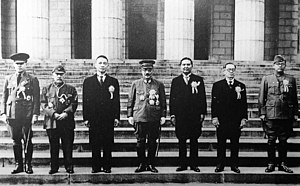Ba Maw
[2][3] His father, Shwe Kye was an ethnic Mon from Amherst (now Kyaikkhami) and well-versed in French and English languages.
San had started a tax revolt in Burma in December 1930, which quickly grew into a more widespread rebellion against British rule.
According to Ba Maw, the government "...under the cloak of judicial trail, went on enforcing the law against thousands of villagers who knew nothing of that law, but only how they were unable to pay their taxes in time, and their homes and villages were wrecked..."[8]: 12–13 In 1934, Ba Maw served as education minister, and then in 1937, he became premier under the new Burmese constitution.
Ba Maw attended the Greater East Asia Conference in Tokyo in November 1943, where he made a speech speaking of how it was the call of Asiatic blood that drew them together into a new era of unity and peace.
[11] Dissatisfied with him, in 1944 a secret clique within the Imperial Japanese Army made up of Kawabe, Isomura and Ozeki decided to hatch a conspiracy to get rid of Ba Maw and replace him with U Nu.
According to Ba Maw, Japanese militarists believed that a puppet monarchy similar to Manchukuo would be easier to manage and better serve their interests.
The military viewed Taw Phya Gyi, eldest grandson of Thibaw, last king of Burma, as the favorite candidate to occupy the throne.
Taw Payagyi was a young man with no experience or aspirations and no political background, so he was just the kind of easy-to-control nominal Head of State they were looking for.
[citation needed] Ba Maw fled just ahead of advancing British forces via Thailand to Japan, where he was captured [13] later that year by the American occupational authorities and was held in Sugamo Prison until 1946.
When he returned to Burma in August 1946, he was invited by Aung San to join the AFPFL and take an important post in the newly independent government, but Ba refused and reorganized the Mahabama Party as an opposition force.
During the period of his imprisonment Ba Maw managed to smuggle out a manuscript of his memoirs of the war years, during less than two of which (from 1 August 1943 to March 1945) he was Head of State (in Burmese naing-ngan-daw-adipadi, lit.
His book Breakthrough in Burma: Memoirs of a Revolution, 1939–1946, an account of his role during the war years, was published by Yale University Press (New Haven) in 1968.
